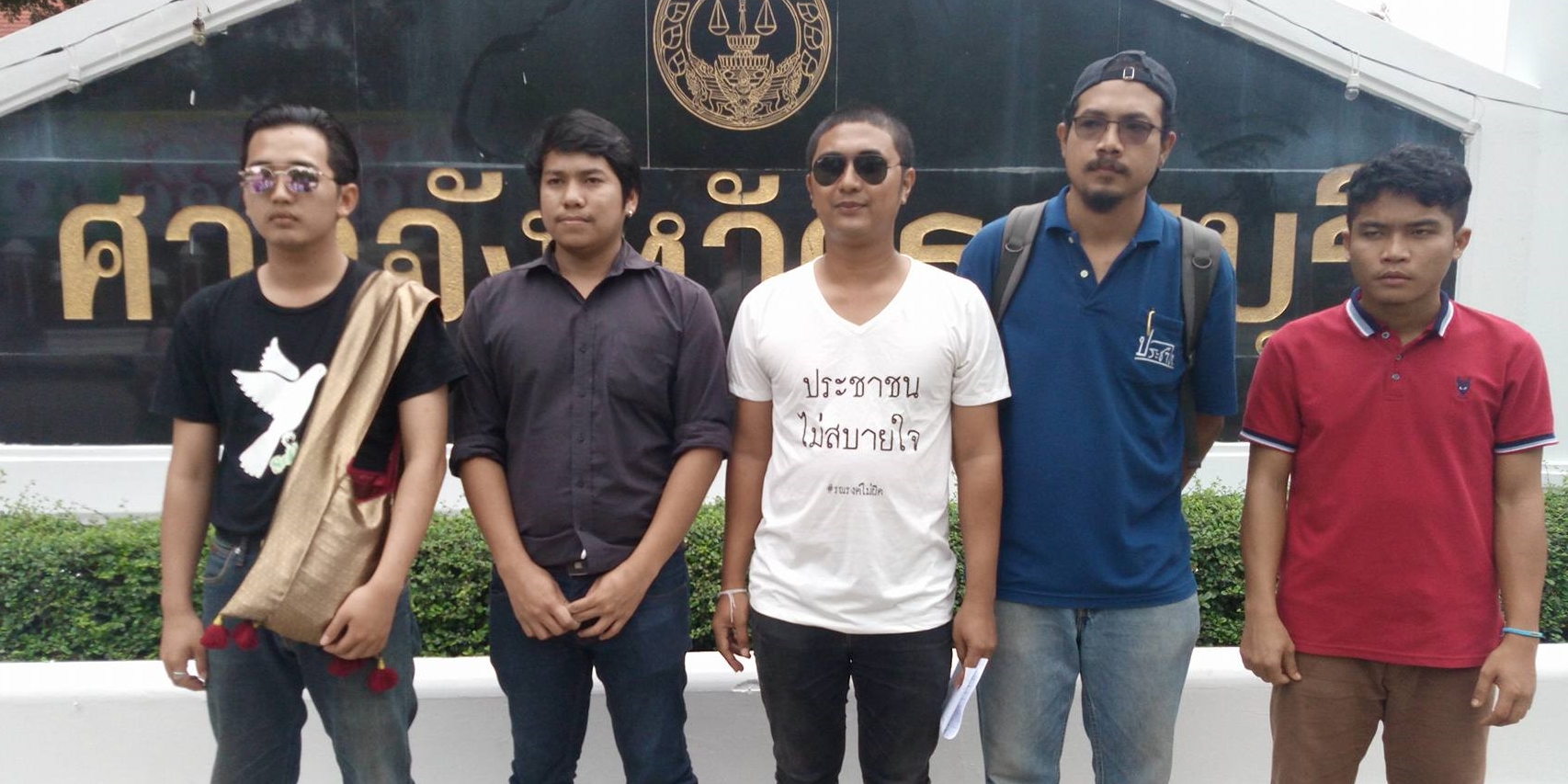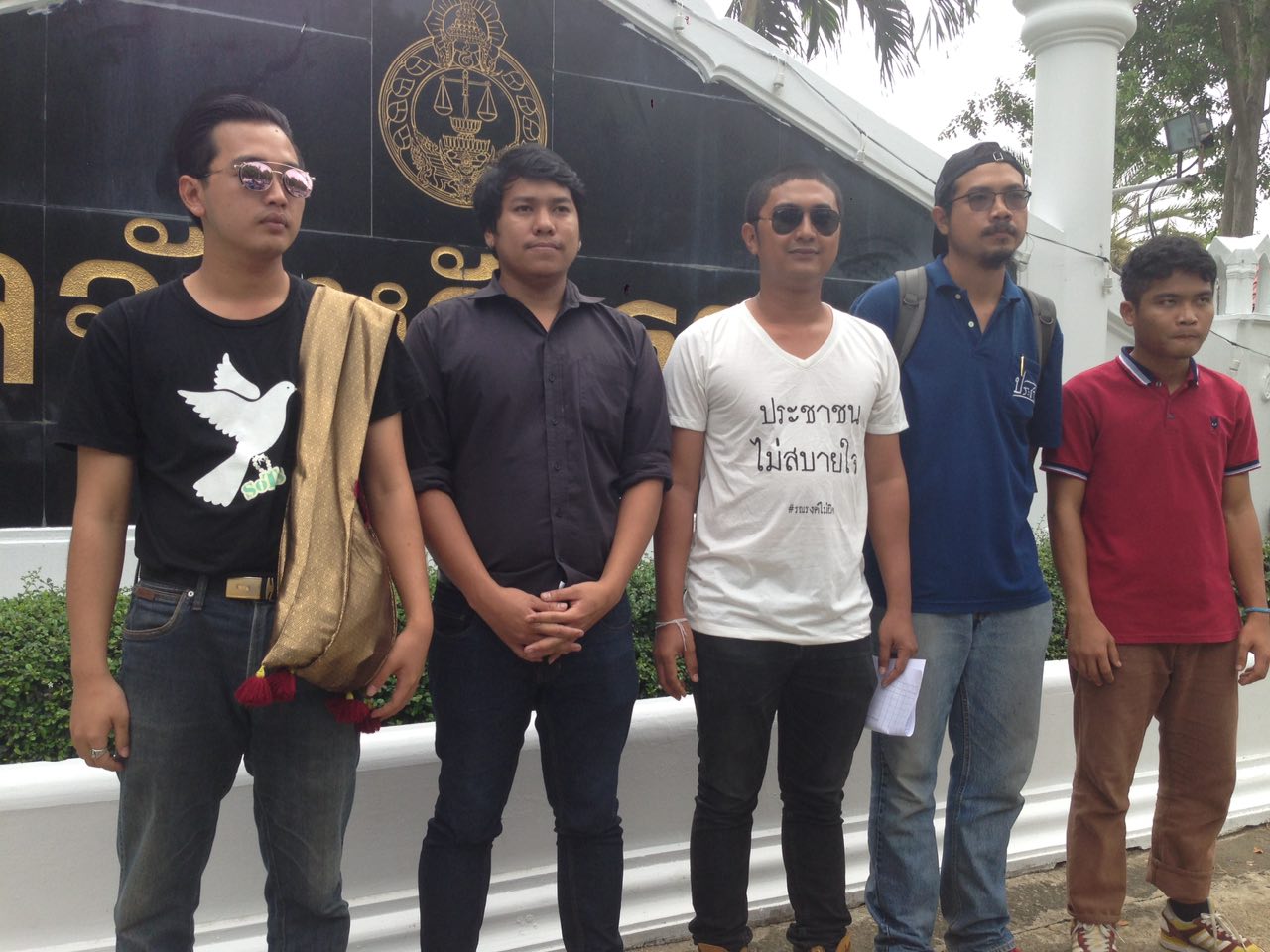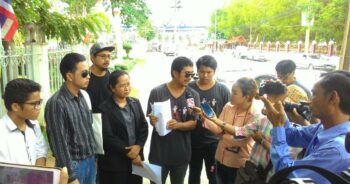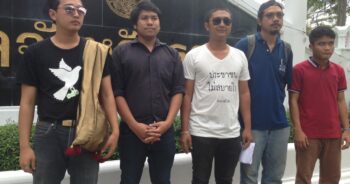The Ratchaburi Provincial Court scheduled a conciliation hearing for four activists and one journalist, indicted with the offences of the Constitution Referendum Act B.E.2559 (2016)’s Section 61 and the Announcement of Council for Democratic Reform under Constitutional Monarchy (CDRM) No. 25 concerning criminal prosecution. The defendants, who petitioned the Attorney General to acquit the case, include Mr. Pakorn Areekul, Mr. Anucha Rungmorakot, and Mr. Anan Loket, members of the New Democracy Movement (NDM), Mr. Panuwat Songsawatchai, Mae Jo University student, and Mr. Thaweesak Kerdpokha, a Prachatai journalist. The defendants denied all charges and intended to defend the case. The court will proceed to a witness and evidence deposition at 8.30 on 17 October 2016 as scheduled.
On 21 September 2016, Mr. Pakorn Areekul, Mr. Anucha Rungmorakot and Mr. Anan Loket, members of the New Democracy Movement (NDM), Mae Jo University student Mr. Panuwat Songsuwatchai, and a Prachatai journalist Mr. Thaweesak Kerdpokha reported to the Provincial Court of Ratchaburi for a scheduled conciliation hearing in the case of Vote-No Stickers at Baan Pong. The defendants were indicted with the attempted distribution of the stickers displaying dissenting messages, in violation of the Constitution Referendum Act Section 61, which states that any person having disseminated documents which are inconsistent with the truth or violent and inciting shall be punishable by one to ten years imprisonment and a fine of 20,000 to 200,000 baht for an act committed by a group of five persons or more. Further, the Court may revoke the right to vote for up to ten years. Before the session, the defendants filed a petition to the Attorney General at the Ratchaburi Provincial Prosecutors’ Office, requesting the acquittal of the case. (See more)
The petition states that the Referendum Act’s Section 7 has guaranteed the freedom to freely express one’s opinions and disseminate factual information concerning the Draft Constitution Referendum. The stickers displaying messages of “7 August: Let’s Vote No to Reject the Undesirable Future” contain texts which, in contrast to the indictment, were not inconsistent with the truth, violent, or inciting aimed to prevent voters from casting a ballot or to convey the vote in any direction. The defendants claimed their actions legal and under the exercise of freedom under the law. In addition, the prosecution does not serve public interests, but instead harms the government’s image in the international community of their human rights affairs, and disturbs the harmony amongst the people.
At 9.20, the session started with the absence of the prosecutor. The Court read out the case file, then stated that the Constitution Referendum Act was enacted to ensure public order and to prevent any actions that deem to create disturbance during the referendum. Reasoning that it carries low punishment of less than ten years’ imprisonment and a 20,000 to 200,000 baht fine (approx. 570-5700 USD), the Court viewed the bill as provisional rather than permanent. And since the Draft Constitution has already been approved, the Court shall proceed to deliver the decision immediately if the defendants plead guilty.
The defendants’ lawyer argued that the stickers were not in violation of the Referendum Act, citing the words of Somchai Srisutthiyakorn, a member of the Election Committee (EC). Some of the defendants are students, and one is a journalist who was covering the news in Ratchaburi that day. The lawyer then argued that the alleged actions were based on a difference of opinions, which individuals are entitled to, and were peacefully carried out in an unaggressive manner, with no intention to orchestrate political unrest. Noting that the case does not benefit the general public, the lawyer asked the court to move to the dismissal of the case.
The Court then requested information on similar cases currently being tried in other courts, and stated that it would take such cases as the model to proceed this case in the same manner. The lawyer cited the Anti-Corruption Centre case, where the National United Front of Democracy Against Dictatorship (UDD) members were accused of violating the NCPO Order no.3/2015, which bans political gatherings of five persons or more, for setting up a centre to monitor the referendum or the Referendum Watch Centre.
The lawyer raised concerns from the United Nations Office of High Commissioner for Human Rights (OHCHR) that the case would not form unity among the people, benefit the public interests, or reflect the respects on human rights. The lawyer also noted that they will face a permanent criminal record if the defendants plead guilty. Moreover, the defendants truly believed that their actions were legal, and did not intend to distort any information to their advantages or agitate the public.
The Court then stated that the case could result in different directions depending on the judicial interpretation, and noted that the Court would proceed with the deposition hearing if the prosecutor did not withdraw the case. The Court further stated the wish to discuss with the defendants’ lawyer the approaches to this case. On one hand, the prosecution will proceed if the defendants plead not guilty. On the other hand, if they confess to all charges, the Court shall subject them to a punishment under the court’s discretion granted by the law. In this case, the Court is able to demand a punishment that does not inflict on the defendants’ criminal record, based on their age, past record, education, occupation and so forth. The Court needed to consult with the Superior Court an appropriate approach that would benefit the defendants.
The lawyer, however, persisted with the defendants’ intention to defend the case, remarking the attention gained from the media and the general public. In addition, many politicians who had voiced their support for the Draft Constitution were not charged under the same act. The defendants’ actions were simply a difference of opinions, believing that the voters could make a sound judgement and decide for themselves. The lawyer then asked the Court to hear the defendants’ statements, as follows.
Mr. Pakorn Areekul, the defendant no.1, claimed that the distribution of the stickers were to express their opinions about the Draft Constitution. Once their actions are punishable, then any dissenting opinion of the Draft Constitution is potentially at fault. Mr. Somchai Srisutthiyakorn, a member of the EC, even stated that he would stand as their witness if the case proceeded. The defendants will not plead guilty since it will set standards for other cases and create an atmosphere of fear to exercise the freedom of expression in the future.
Mr. Taweesak Kerdpokha, the defendant no.2, stated that his presence as a journalist was to cover the news of people reporting for charges due to setting up a Referendum Watch Centre in Ratchaburi. He noted that he had no connections to the stickers and other documents found during the car search, and that the case harmed the government’s image more when it prosecuted a reporter.
Following the lawyer’s and the defendants’ statements, the Court read out the indictment, stating the rights and duties of the defendants under the law, the litigation process, and the defendants’ contrition and responsibilities of committing a crime. The defendants then pled not guilty and declared their intentions to defend the case. The Court set an appointment for the deposition of witnesses and evidence at 8.30 on 17 October 2016.
Related Links:
Vote-No Activists and Reporter Prosecuted under Constitution Referendum Act
Document allegedly violate Thailand’s Constitution Referendum Law
Activists detained for campaigning to vote ‘No’ in constitution referendum




